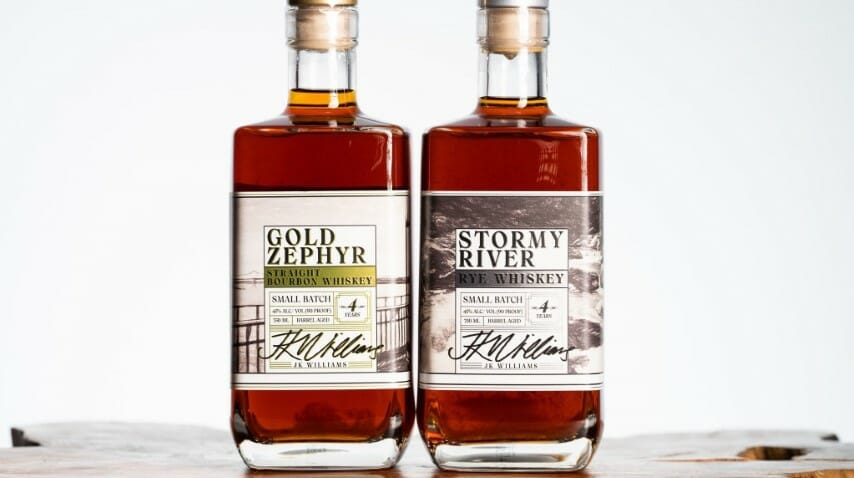Tasting: 2 Whiskeys (Bourbon and Rye) From Peoria’s JK Williams Distilling
Photos via JK Williams Distilling
There are so many small distilleries and independent bottlers out there today, that yet another young company buying and bottling whiskey from a giant factory like MGP of Indiana is hardly worthy of mention. Indeed, as a writer it’s hard to not eventually tune that sort of thing out, when you hear of a new brand and find out “hey, this is some more young MGP bourbon or rye.”
Decently aged, self-distilled spirits, though … now that is more interesting. It’s pretty rare that I get a first press release from a distillery, introducing their new brands, and find them to be 4-year-old bourbon or rye that they distilled themselves. And indeed, that’s what piqued my interest when it came to Peoria, Illinois’ JK Williams Distilling.
The story of this company is a slightly complicated one, steeped in history running all the way back to Prohibition-era America. Before 1919, the central Illinois city of Peoria was actually one of the nation’s leading producers of both beer and spirits—the city was home to no fewer than 24 breweries and 73 distilleries, and proclaimed itself the “Whiskey Capital of the World” for the fact that it paid more excise tax on alcohol production than any other city in the U.S. We’ve written quite a bit previously on this time period, in which taxes on alcohol were the single largest source of income for the federal budget—a fact that directly necessitated the creation of the Income Tax in the U.S. in order to make Prohibition a possibility.
The original J.K. Williams was reportedly a distillery/bootlegger of that era, “run out of town by Al Capone during Prohibition,” according to the distillery. But here’s where things get confusing: A company called J.K. Williams Distilling was created by his descendants in the early 2010s, distilling in East Peoria to continue their great-grandfather’s legacy. This company apparently produced fruited whiskey recipes, although they also were distilling and patiently aging bourbon and rye whiskey. However, that J.K. Williams Distilling ultimately closed down in 2018 after a few years in operation. Their stills and aging inventory was then acquired by new (and current) owners Andy Faris and Stacy Shunk, and the company was subtly renamed as JK Williams Distilling, without the periods in “JK.”
The current JK Williams Distilling product, then, was originally distilled by the previous company, and is now being distilled in a new Peoria facility. There’s both a bourbon and a rye, each of which are four years old and bottled at 90 proof—unusually old spirit for a company’s first true release.
I received samples of both whiskeys, so let’s finally get to tasting.
Gold Zephyr Straight Bourbon WhiskeyPrice: $59.99
This is a 4-year-old straight bourbon, distilled, aged and bottled in Peoria, IL. It weighs in at a mid-strength proof point of 90, but as a pretty lofty asking price of $60, which is a lot for a company launching its first product without a familiar pedigree. The mash bill isn’t publicly available, as far as I know.